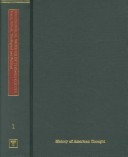Philosophers of the Spirit S.
1 total work
Thomas Cooper (1759-1839) is an important but much neglected early proponent of a radical materialist metaphysics. He adopted his materialism from his friend Joseph Preistley but he differed from his master on a number of philosophical issues (such as personal identity). Like Priestley, he emigrated to America in 1794, where he first practised as a lawyer in Pennsylvania, then taught chemistry at several colleges, before becoming president of South Carolina College, Columbia in 1820. Cooper had been associated with democratic clubs in England and had spent some time in Paris with affiliated French clubs during the Revolution. In America he joined the Democrats and vehemently opposed the administration of President Adams. In 1800 he was tried for libel and setenced to six months in prison. Cooper's works are extremely scarce. His philosophical writings have not been reprinted since the 18th and early 19th centuries. The first two volumes of this edition include his early and most important philosophical publication, "Tracts, Ethical, Theological and Political" (1789) and the second edition of his early political essays (1800).
The third volume contains a selection of metaphysical and political essays from the 1820s and 30s. The introduction by Udo Thiel gives an explanatory overview of Cooper's philosophy, placing it in its historical and intellectual context.
The third volume contains a selection of metaphysical and political essays from the 1820s and 30s. The introduction by Udo Thiel gives an explanatory overview of Cooper's philosophy, placing it in its historical and intellectual context.
